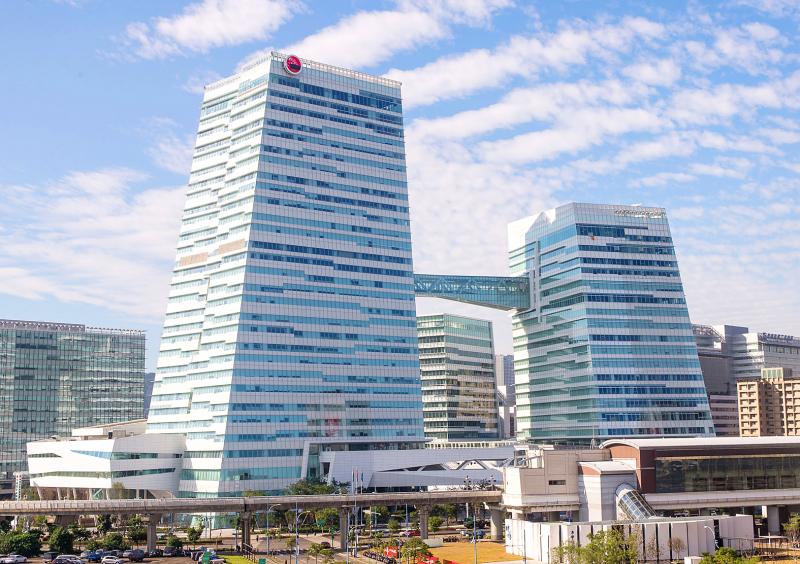CTBC Bank (中國信託銀行) ranked first among its Taiwanese peers for a sixth straight year in the Top 1,000 World Banks list published by The Banker magazine on July 4, jumping two places to the 158th spot in the overall ranking.
The recognition followed last month’s announcement that the bank would be awarded Euromoney magazine’s Awards for Excellence.
CTBC has been named Best Bank in Taiwan 13 times since the award was launched in 1997, outranking all other Taiwanese banks and setting a new record in the nation’s financial sector.

Photo courtesy of CTBC Bank
With its solid business performance and sustained control of asset quality and capital adequacy, CTBC Bank ranked for the sixth time in UK-based The Banker’s top 1,000 list, taking the top position among Taiwan’s banks with US$11.59 billion in tier 1 capital, which is US$658 million more than last year.
Euromoney ranked CTBC Bank as the Best Bank in Taiwan, principally in recognition of its clear strategic blueprint, which focuses on the three main axes of digital transformation, sustainable finance and overseas expansion.
By leading the financial sector in developing a range of business innovations and sustainable reforms, the bank has maintained steady growth even while facing the challenges of financial market turbulence and the COVID-19 pandemic.
CTBC Bank has over the past few years been investing in digital technology and transforming its core systems, partnering with industry leaders in various sectors to develop innovations and synergistically create a range of new business models.
In view of the risks posed by global climate change, CTBC Bank has assumed a key role in working toward net-zero carbon emissions by voluntarily adhering to the UN’s Principles for Responsible Banking and formulating a climate risk management policy.
The bank has set a clear internal business strategy for sustainable development, channeled capital toward green industries and exerted positive financial influence through financing and investment tools to drive corporate transformation and work with customers to promote a low-carbon economy, as well as create a responsible financial ecosystem.

DIVIDED VIEWS: Although the Fed agreed on holding rates steady, some officials see no rate cuts for this year, while 10 policymakers foresee two or more cuts There are a lot of unknowns about the outlook for the economy and interest rates, but US Federal Reserve Chair Jerome Powell signaled at least one thing seems certain: Higher prices are coming. Fed policymakers voted unanimously to hold interest rates steady at a range of 4.25 percent to 4.50 percent for a fourth straight meeting on Wednesday, as they await clarity on whether tariffs would leave a one-time or more lasting mark on inflation. Powell said it is still unclear how much of the bill would fall on the shoulders of consumers, but he expects to learn more about tariffs

NOT JUSTIFIED: The bank’s governor said there would only be a rate cut if inflation falls below 1.5% and economic conditions deteriorate, which have not been detected The central bank yesterday kept its key interest rates unchanged for a fifth consecutive quarter, aligning with market expectations, while slightly lowering its inflation outlook amid signs of cooling price pressures. The move came after the US Federal Reserve held rates steady overnight, despite pressure from US President Donald Trump to cut borrowing costs. Central bank board members unanimously voted to maintain the discount rate at 2 percent, the secured loan rate at 2.375 percent and the overnight lending rate at 4.25 percent. “We consider the policy decision appropriate, although it suggests tightening leaning after factoring in slackening inflation and stable GDP growth,”

Greek tourism student Katerina quit within a month of starting work at a five-star hotel in Halkidiki, one of the country’s top destinations, because she said conditions were so dire. Beyond the bad pay, the 22-year-old said that her working and living conditions were “miserable and unacceptable.” Millions holiday in Greece every year, but its vital tourism industry is finding it harder and harder to recruit Greeks to look after them. “I was asked to work in any department of the hotel where there was a need, from service to cleaning,” said Katerina, a tourism and marketing student, who would

i Gasoline and diesel prices at fuel stations are this week to rise NT$0.1 per liter, as tensions in the Middle East pushed crude oil prices higher last week, CPC Corp, Taiwan (台灣中油) and Formosa Petrochemical Corp (台塑石化) said yesterday. International crude oil prices last week rose for the third consecutive week due to an escalating conflict between Israel and Iran, as the market is concerned that the situation in the Middle East might affect crude oil supply, CPC and Formosa said in separate statements. Front-month Brent crude oil futures — the international oil benchmark — rose 3.75 percent to settle at US$77.01